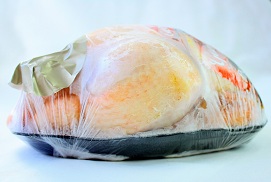Reducing the environmental impact of food packaging

Related topics
Agriculture & Forestry Food & Healthy Diet Innovation Belgium Czechia France Greece Italy Spain Food security, sustainable agriculture and forestry, maritime and martime inland water research and bio-economydate: 06/05/2014
Project: SUCCIPACK
acronym: Development of active, intelligent and s...
See also: CORDIS
Contact: www.succipack.eu
PBS is synthesised by polycondensation of succinic acid and butanediol. Both of these substances can be extracted from renewable resources and PBS is expected to be widely available in the coming years.
The SUCCIPACK project, which is led by the Association de Coordination Technique pour l’Industrie Agro-alimentaire (ACTIA) in France, took this synthesised product as a basis for developing new materials for the packaging industry. According to the SUCCIPACK team, the project can be seen as a response to consumer demand for safer and greener packaging.
For the new packaging materials to be readily taken up by the industry, it was important to demonstrate that there is no extra cost implication associated with their use. Christophe Cotillon, the project coordinator, says that “the new materials are designed to be used with the existing equipment of food and packaging companies.”
In particular, the project team is exploring new polymerisation paths – i.e. process used to form polymer chains – to improve PBS properties. For instance, the Polytechnic University of Athens, one of the project partners, is working on the polymerisation process called SSP (Solid State Polymerisation) which allows the properties of polymers to be enhanced before being processed into films, trays and cups etc.
Moreover, the research team is conducting an exhaustive safety assessment of the materials and packaging developed. The first tests have demonstrated the feasibility of the material for packaging fresh ricotta cheese and beef.
Future implementation tests are planned to determine how the material performs for the processing of films (extrusion), trays (thermoforming) and cups (injection) for packaging fish, chicken and vegetarian dishes.
Cooperation among the research organisations brought together under the SUCCIPACK project was vital to its success so far. The research organisations are also working with large industrial players and 10 small to medium-size enterprises to ensure the effective uptake of the project results by the food and packaging industry.
The project partners are currently continuing to make improvements to the processing of the polymer and to the performance of the new material and packaging developed.
